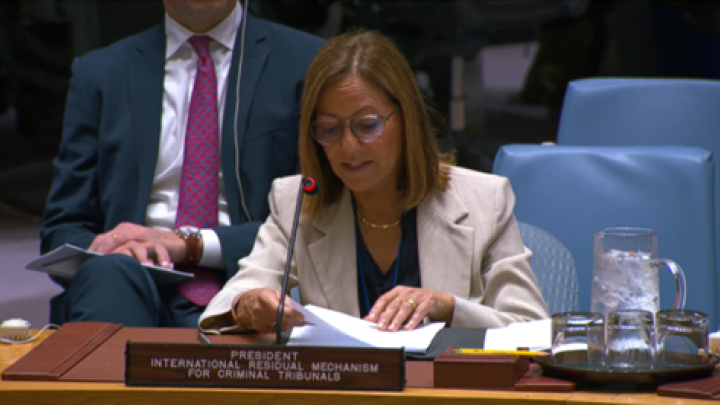President Gatti Santana briefs UN Security Council on progress of Mechanism’s work

Today, the President of the International Residual Mechanism for Criminal Tribunals (Mechanism), Judge Graciela Gatti Santana, presented the Mechanism’s twenty-sixth progress report to the United Nations Security Council (Council) in New York.
President Gatti Santana began her address by noting the upcoming 30th commemoration of the 1995 Genocide in Srebrenica, describing it as a “moment of historical and moral significance”. She underscored the vital role played by the ad hoc Tribunals in judicially establishing the Srebrenica Genocide and the 1994 Genocide against the Tutsi in Rwanda—landmark findings that have since been affirmed by the Mechanism.
Recalling the Council’s vision of the Mechanism as a cost-effective and temporary structure, President Gatti Santana emphasized the Mechanism’s continued focus, fairness and efficiency in the execution of its mandate. In this context, she reported on recent judicial activity, including the swift resolution of Mr. Gérard Ntakirutimana’s review proceedings. The President observed that, during the reporting period, Mechanism Judges issued over 100 decisions and orders, most of them in relation to continuous judicial functions such as the variation of witness protection measures.
The President also provided updates regarding sentence enforcement and contempt matters, highlighting that the Mechanism has narrowly exercised its contempt jurisdiction, with two recent cases referred to national authorities in line with the Statute and the referral of another case currently under consideration.
Turning to State cooperation, President Gatti Santana stressed that this “remains pivotal not only to the Mechanism’s efforts to reduce costs and complete key functions but to fulfilling the humanitarian principles upon which international criminal justice is founded”. She drew particular attention to the ongoing detention of Mr. Félicien Kabuga, whose trial was indefinitely stayed in 2023, noting that the absence of a willing and suitable State for his provisional release raises due process concerns. Separately, while expressing profound appreciation for the support provided by the Mechanism’s current enforcement States, the President reiterated the pressing need for additional States to accept enforcement responsibilities. Doing so, she explained, would help reduce the Mechanism’s operational footprint and end the prolonged uncertainty faced by convicted persons awaiting transfer.
As further evidence of the critical importance of State cooperation, the President identified two unresolved matters: the long-standing situation of the acquitted or released individuals who were relocated to Niger in December 2021, and Serbia’s persistent refusal to execute outstanding arrest warrants against Mr. Petar Jojić and Ms. Vjerica Radeta, despite its legal obligations and the repeated referrals of the matter to the Council.
Looking ahead, President Gatti Santana discussed Council resolution 2740 (2024), which tasks the United Nations Secretary-General with providing reports on options for the transfer of certain Mechanism functions and possible locations of the archives. She shared her perspective on the potential transfer of the supervision of sentence enforcement function, acknowledging that specific administrative aspects—such as oversight of detention conditions—could be delegated to States. However, the President strongly cautioned against transferring responsibility for the adjudication of applications for pardon, commutation of sentence or early release of convicted persons. She warned that this would result in unequal treatment of the Mechanism’s more than 40 convicted persons and “undo decades of work that, until this point, has held impunity in check”.
The President observed that the Mechanism’s continuous judicial functions implicate fundamental rights, ensure witness protection, and remain essential to the integrity of international proceedings. While workable, just, and fair solutions for the transfer or even termination of certain functions may emerge as activity declines, it remains preferable—while judicial work continues apace—to retain these functions at the international level, ensuring that the interests of justice are protected before any such changes are made.
In bringing her remarks to a close, President Gatti Santana noted that the upcoming 30th commemoration of the Srebrenica Genocide is a reminder that “justice is not a finite endeavor; it is a continuous commitment”. She reaffirmed in this respect that, despite today’s global challenges and limited resources, the Mechanism remains dedicated to its mandate. At the same time, she acknowledged that changes are necessary to ensure that the Mechanism’s remaining contributions to the justice cycle are delivered at a cost the international community can support. “[W]e will partner with this Council”, the President concluded, “as it seeks to preserve the legacy of the Tribunals for Rwanda and the former Yugoslavia in a further reduced Mechanism and, ultimately, beyond its operational lifespan”.